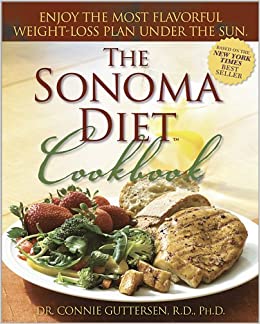Continued from Sonoma Diet Plan: Dr. Connie Guttersen
Isn’t fiber also a key player in weight loss?
Yes, for several reasons. We know that fiber helps you to feel full and satiated, and it also has great effects on blood sugar, keeping it from spiking up and down.
So that in itself has a real effect on hunger.
Fiber is also one of the key nutrients that reduces risk factors for something called metabolic syndrome (also called chemical active disease), which is a syndrome that includes the extra pounds around the waist which lead to high cholesterol, and low HDL.
With that syndrome you have higher blood sugar levels, which leads to insulin resistance, and you have the perfect setting for something called prediabetes, which leads to Type 2 diabetes.
You also have the perfect setup for heart disease and they now even link it to Alzheimer’s.
Isn’t olive oil central to the Sonoma Diet?
Yes, there’s probably no food choice you’ll make that does more for your health and weight loss efforts than olive oil.
The research is clear that a major reason for southern Europeans’ low rate of heart disease is their liberal use of olive oil as their main source of dietary fat.
You need dietary fat to lose weight, but you need the right kind. Olive oil is mostly made of mono-unsaturated fat that actually lowers your levels of the bad LDL cholesterol and triglycerides.
It’s definitely a power food. Canada oil is another good oil, but it doesn’t have the flavor or the antioxidants of olive oil.
Other power foods on your list include strawberries, blueberries, and grapes. But what if you start this diet in the winter?
Fresh is ideal, but you can buy frozen blueberries and strawberries in the wintertime. Another power food you can get any time is almonds. If you put almonds into a salad or even over streamed greens it will help you feel full.
The particular protein in almonds is wonderful for satiety. The fat in almonds is mainly the heart-healthy mono-unsaturated fat, and there is a growing consensus in the medical community that almonds decrease the risk for heart disease.
Other studies have shown that almonds are protective against cancer and diabetes as well.
You also have spinach and bell peppers on your list of power foods. Isn’t it true that the deeper and richer the color, the more antioxidants?
Sure. And eating a wide variety of veggies and fruit is important. You should eat foods from all the colors: yellow, green, red, orange, purple. A salad is a lot more than just iceberg lettuce and tomatoes!
You recommend including wine in the Sonoma Diet. Is this specifically red wine?
No, any kind. Having a glass of wine with dinner can decrease the risk factor for hypoglycemia, Alzheimer’s, cataracts, and increase longevity. I think more importantly it helps people to enjoy their meal; it’s relaxing and you tend to eat slower.
But the wine does add extra calories.
Yes, but it’s worth it-although I do leave it off of Wave One for that reason.
You recommend eating 75% protein at breakfast, but this is much different than what most people are used to doing (such as a muffin and coffee). Why do you think protein is so important in the morning?
If you eat protein at breakfast, it helps to get you through until lunch without feeling ravenous, and thus snacking on the wrong thing. It’s not really that much protein-because it’s a small plate, we’re really talking about only an ounce of protein for breakfast.
What do you think about synthetic sweeteners like Equal and Sweet n Low?
I don’t recommend them, especially in the beginning. After you have had a craving or a dependence on sugar, you can’t break the habit if you keep feeding it-and the brain still tastes sweet even if it’s not real sugar.
You need to break yourself of the craving, and the idea is to tone down the level of your consumed sweeteners.
What do you think about having a glass of orange juice in the morning?
Fruit juice is very high in calories if you’re trying to lose weight. And you’re not getting the fiber that’s in the whole fruit; instead you have a very concentrated amount of sugar.
I think you benefit more from the fiber and the diluted sweeteners by eating the whole fruit. It’s not that I have anything against juice; it’s just when people are trying to lose weight it’s not the smartest decision for them.
Your book says you are allowed up to two cups of coffee per day, but that it should be black. What about soy milk?
Yes, that’s fine. You can even add a little bit of milk, but just make sure that there’s no trans fats, like those nondairy creamers.
What do you think of the vegan diet that Dr. McDougall recommends?
I think it’s too low-fat. I’m not a big fan of very low-fat diets. Number one, I find they are lacking in flavor.
Also, when you look at the metabolic syndrome, the disease of obesity, that condition actually benefits from a moderate amount of dietary fat, as long as it’s the right types of fat, such as the fat in olive oil or almonds.
Lastly, there’s been some evidence that low-fat diets can lead to depression.
Haven’t you also recently written The Sonoma Diet Cookbook?
Yes, it’s in the stores now. With the cookbook I was able to go into Latin and Asian flavors and some other world cuisine recipes.

